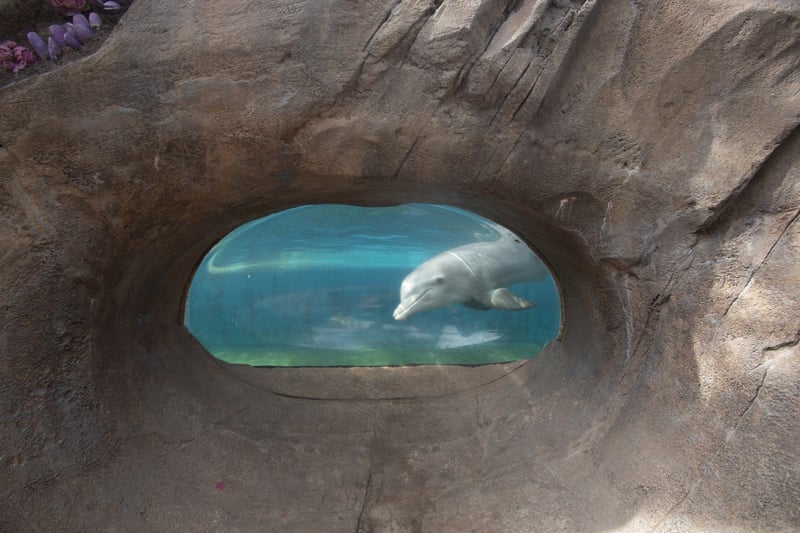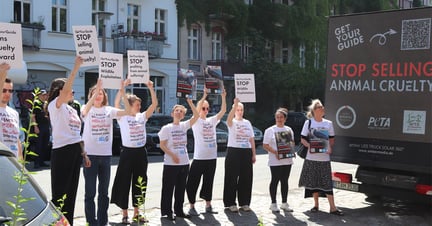
Calling on TUI to stop choosing profits over animals, people, and the planet.
News
Despite NGOs calling for change for many years, TUI is still choosing to put profits over the welfare of captive animals.
Imagine, for a moment, a pod of dolphins in the wild, their fins and shining backs temporarily appearing as they leap through the waves, the water churning as more and more dolphins come into view.
Now picture a barren tank. A dolphin laying inert at the surface in the middle of the pool.
Most of us hopefully will picture the first – dolphins wild and free, as they should be.
The second is a too common occurrence with over 3600 whales and dolphins in tanks around the world, performing in shows and being made to swim with tourists.
This is not education. It is teaching us only that animals are here for our entertainment.
This is not conservation. These aren’t endangered animals that are part of a rewilding programme. They have been bred in captivity to turn a profit.
This is loud music, a circus, dolphins trained to push trainers out of the water, performing on demand in return for dead fish.
World Animal Protection and a number of other NGOs have been calling on TUI Group for many years now to end the sale and promotion of captive dolphin experiences. But why is now so important?
TUI is one of the biggest travel companies in Europe and is a household brand, with a unique opportunity to influence the sector. By presenting captive dolphin entertainment as an acceptable activity, a desirable one even, they are providing social licence to these interactions, driving ticket sales and lining their pockets.
TUI’s Sustainability Agenda talks about enabling consumers to make more sustainable holiday choices at every stage of the customer journey through better content, signposting and experiences. Yet here is an example from one of TUI’s product pages:
At this attraction, you can enjoy educational entertainment that is fun for the whole family! It’s a place where dolphins walk on water, killer whales fly through the air.
It is worth noting that this particular copy refers to Miami Seaquarium, a venue notorious for keeping its animals in terrible conditions, which regularly faces calls to be closed down due to poor animal welfare.
Millions of animal lovers every year are fooled into thinking that shows with dolphins are cruelty-free, educational and good for conservation efforts. But this could not be further from the truth.
Whales and dolphins suffer in captivity. Their unsuitability for life confined to a tank is backed up by scientific evidence time and time again yet still the adverts show a glossy version of this cruelty, with dolphins leaping from aquamarine waters, their natural jawline misleadingly giving the illusion of a smile. In a global poll conducted by World Animal Protection in 2022, 84% of people interviewed believed that tour operators should not sell activities that cause wild animals suffering.
A dolphin’s tank is around 200,000 times smaller than their natural range. In the wild they are known for their strong family bonds, which are widely ignored in the industry as calves are separated from mothers and bonded animals are moved to other parks. Whales and dolphins are incredibly intelligent with signs of language (recent research showed them referring to each other by ‘names’) and culture. In captivity, they often show signs of stress, displaying stereotypical behaviours such as grinding their teeth down on the bars between enclosures, or endless circling of the tank.
Over the last few years Canada, Brussels and New South Wales have passed laws to prohibit whale and dolphin captivity. Travel companies including Expedia Group, Nordic Leisure Travel Group, Virgin Holidays, British Airways, Tripadvisor and Booking.com have removed offers for dolphin entertainment.
Over 120,000 supporters across Europe have signed World Animal Protection’s petition asking TUI Group to stop selling and promoting dolphin cruelty. Supporters in Denmark and the Netherlands shared negative reviews and 320 independent travel agents in the UK have signed an open letter to TUI UK & Ireland asking them to stop selling captive dolphin entertainment. Even TUI staff have voiced their concerns.
Today is TUI Group’s AGM.
In 2023, TUI responded to complaints of greenwashing by saying ‘We aim to take action where possible’.
Well, TUI, it is possible, and it is high time that you do something about ending dolphin cruelty.
Your customers are watching.
Sign up to our newsletter
Sign up to hear about the work World Animal Protection is doing to end animal cruelty, and learn what vital actions you can take to protect animals
What does World Animal Protection do?
Discover more about our mission, what we have achieved over the last 70 years, how we are run, and how we use our kind supporters' donations.

